15 practical examples of GPT-3/GPT-4 prompts to support content marketing, email marketing, search and social media marketing
In Part 1, of my review of marketing applications of Chat GPT, I reviewed the quality of output and interactions of the GPT-3 Large Language Model (LLM) on which ChatGPT is trained by asking: How can I use ChatGPT for marketing? I showed how you can use ChatGPT for learning more about digital marketing and marketing planning by creating plans.
In this article, I will explain some practical use cases of how marketers can use Chat GPT for content marketing to support different digital marketing channels. We'll see that knowing how to Prompt ChatGPT will be a key skill, so I'll show different Prompting techniques before reviewing specific applications for the different digital marketing channels.
Some of the key digital marketing channels that I'll describe are summarised in this visual from my book Digital marketing: Strategy, Implementation and Practice. In the prompt examples, I'll focus on organic and paid search and social media marketing, but starting with email marketing.
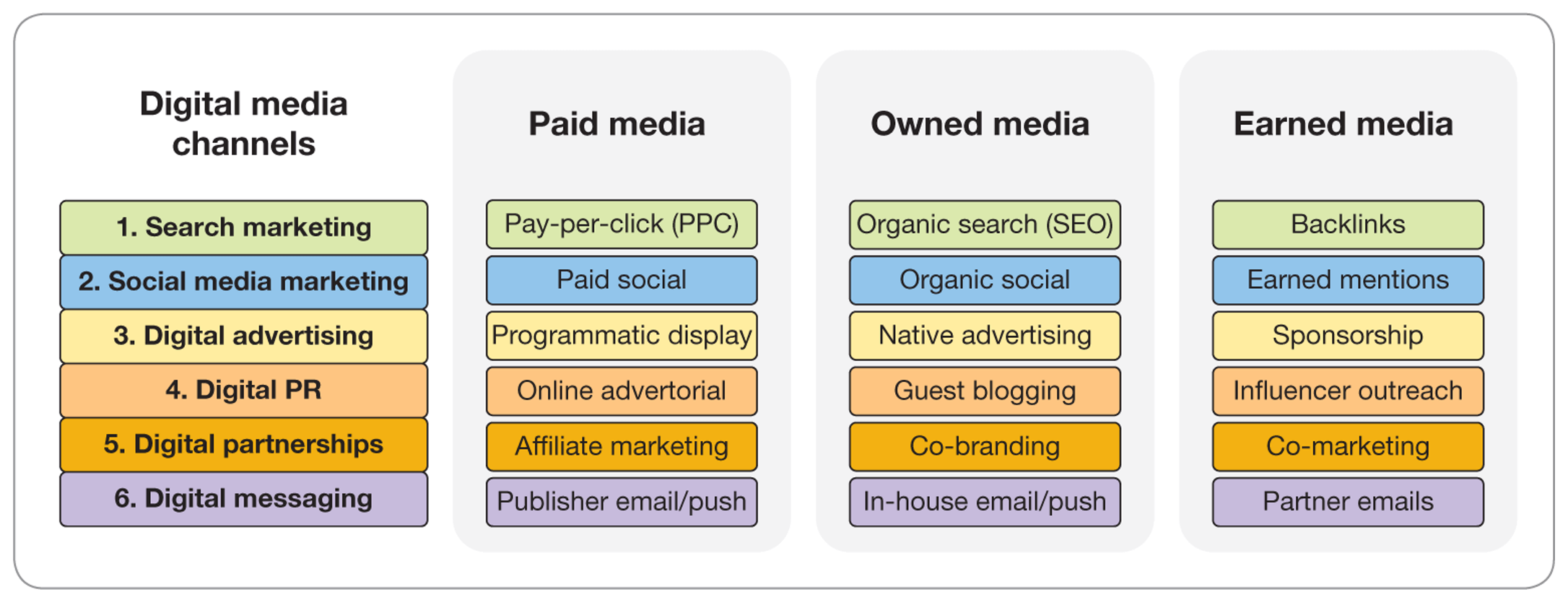
How many marketers are using ChatGPT?
Our recent LinkedIn survey found that more than three-quarters of marketers want to use ChatGPT to improve their marketing performance, but only 40% are actively doing so right now.
Sometimes, it can be difficult to know where to start. That's why we've created a Quick Win for Smart Insights Business Members to rapidly review and assess new ChatGPT opportunities in 2023: How to use ChatGPT for marketing.
This guide is for anyone looking to learn more about ChatGPT, but would be particularly useful for marketers making decisions about how and where to employ the AI chatbot collaboratively, to improve efficiency in your team, in less than 20 minutes.
Access our Quick Win – How to use ChatGPT for marketing
Discover everything you need to know about the new AI chatbot ChatGPT and how you can use it for marketing in our Quick Win.
Access the
If you're a content marketer or SEO specialist or strategist, we also have a Quick Win with specific details about using AI for SEO with ChatGPT.
What is 'Prompt Engineering'?
A lot of the excitement amongst marketers about ChatGPT is that across all the media and channels shown, it can act as a 'hands-on' productivity tool for analysis and creative. I certainly don't think it will replace marketers just yet, but I see it as a great collaborative tool to improve the quality of creative and to create more effective content.
Dylan Robers from KMPG told Business Insider "It's going to automate select tasks that knowledge workers are engaged in today so that they can focus on higher-value tasks". I agree, or at least ChatGPT plus more marketing-specific Generative AI tools built on LLMs. So, before we dive in and look at the examples for different channels, it's helpful to learn about how you can best prompt the chatbot.
There are already many articles about how to prompt ChatGPT and there are some 'best practices' to be learned by experimenting with your approach. Some are even calling it Prompt Engineering, but I think that's overstating it, it's certainly not an engineering discipline! There are some simple rules of thumb that can be applied by testing your approach using common sense. You'll find 15 examples of prompts below, plus download our free ChatGPT Prompt Cheatsheet for Marketers for more inspiration.
Download our Free Resource – ChatGPT Prompt Cheatsheet for Marketers
An A-Z of all the top prompting tips you need to maximize ChatGPT's output for marketing.
Access the ChatGPT Prompt Cheatsheet for Marketers
Understanding Zero, One and Few Shot prompts for ChatGPT
ChatGPT is an advanced natural language generation (NLG) model that doesn't require prompts (known as 'Zero shot' amongst AI professionals). However, it's useful to know and we will see it works much better if you can be more specific, i.e. you give it specific context through examples and more detailed instructions ('One shot' or 'Few shot').
Prompting is a simple new skill that we will have to learn to improve the quality of ChatGPT results. We can't just rely on the AI, we have to apply our experience and intelligence as what some are calling 'Prompt Engineers'. It's a skill just like learning Google - In the way that some people are better at getting answers from searching Google because of their experience. However, there are no defined 'Advanced search' prompts or syntax, since like Google the Chatbots have dispensed with those because it's natural language.
We'll start with some examples of useful prompting rules for email marketing. Then we'll look at search and social media marketing.
ChatGPT prompts for email marketing - example
The obvious application here is email copywriting, but emails don't exist in isolation. They often work best in a series of communications such as a Welcome sequence, so we will take an example of this to put ChatGPT 'through its paces'. Although this example is email-focused, many of the techniques can be applied to other channels, which will be explored below.
For me, effective marketing copywriting boils down to creating relevance for particular, audience, engaging them, and persuading them to take action to the next step. So, within these examples of Email marketing, I won't just ask ChatGPT to generate a copy, I'll look to understand why that copy has been created. Here is a simple checklist which shows the prompting approach I have developed.
1. Set the context for your email creation
It's an essential practice to start a new conversation to clear previous dialogue and once you have set the context, this is retained through the course of the conversation and you can return to it if you save the dialogue.
Here, you can see I'm specific in my prompt explaining the context. The product I'm promoting is an office cleaning service.
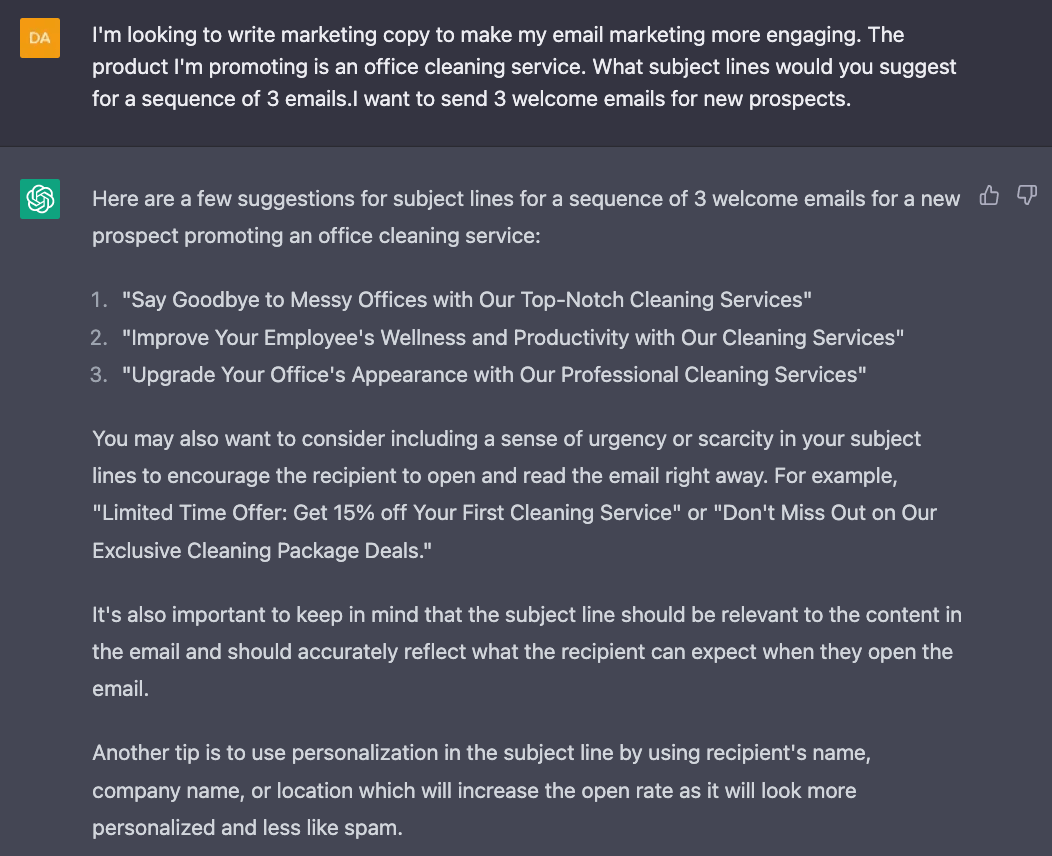 I'm not impressed by these Subject lines TBH, they are 'marketing happy talk', which I'll explain how to improve upon below.
I'm not impressed by these Subject lines TBH, they are 'marketing happy talk', which I'll explain how to improve upon below.
2. Define the task and goal
What do you want the AI to do for you?! Here, the goal is that these are for marketing and welcome emails for new prospects, for example:
- “Generate a compelling email to increase attendance at this upcoming event”
- “Generate a follow-up email following this meeting”
- “Generate a thank-you email for customers who purcased this product”
- “Generate a promotional email to introduce this new service”
- “Create a reminder email for this upcoming meeting”
3. Define Chatbot's tone of voice for in-house email style
It may be sufficient to set the context as shown above, but some have recommended you can improve the quality of the prompt by asking ChatGPT to act as a defined role or with a particular tone of voice. So, for example: "Act As an Email Marketing Copywriter". I didn't find this useful in my use, you can set the context other ways, no need to over-prompt!
4. Ask follow-up questions to improve your WIP email generation
The first subject lines shown above are OK, but are quite generic. They reminded me of what Steve Krug called 'Marketing Happy Talk' in his book 'Don't make me think' i.e. quite bland and generic fluff which is not engaging for the audience. I don't think an experienced copywriter will write: "Say Goodbye to... Top-Notch". Doesn't work for me.
So next ask I asked to refine to give improved alternatives relating to someone in B2B switching to another service. These are much more specific.
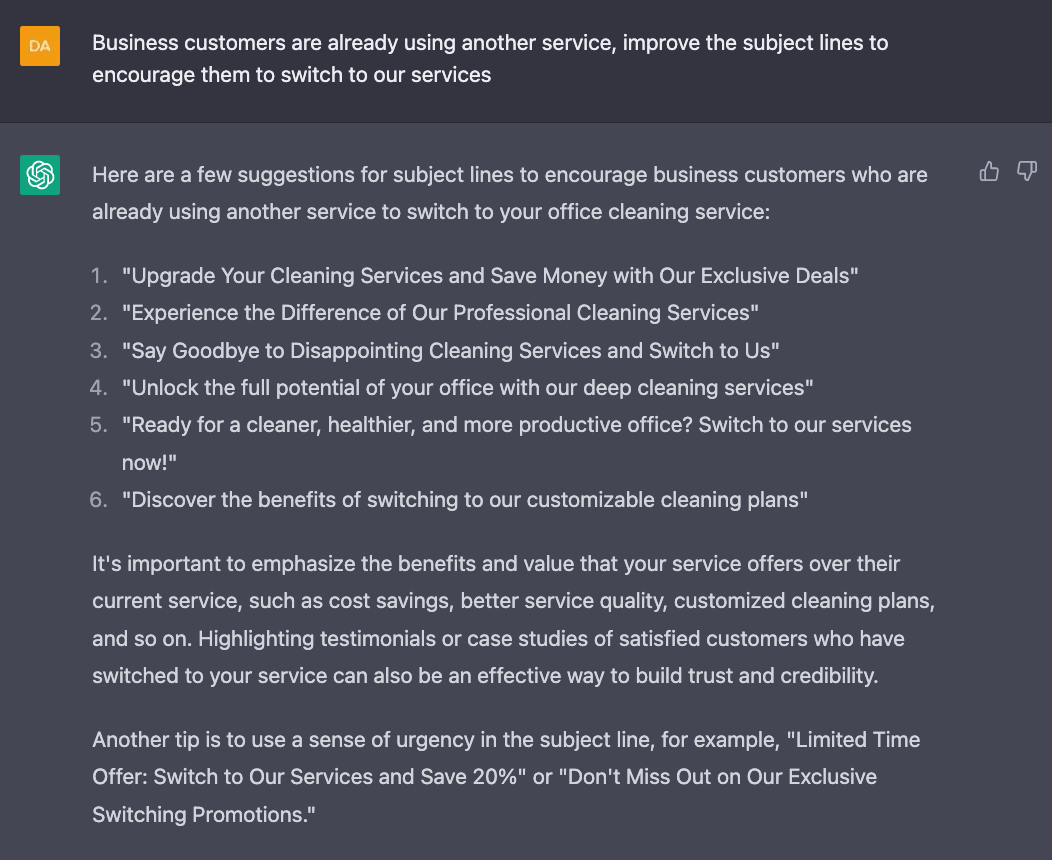
5. Ask for alternatives you can select from
The prompts above show how you can specify the goal, but you will end up with more effective creative if you ask for a number of alternatives.
I initially asked the AI for alternative subject lines as above and then alternatives for the body copy as shown below. Then you can choose from the best or use AB testing to see which works best for your audience
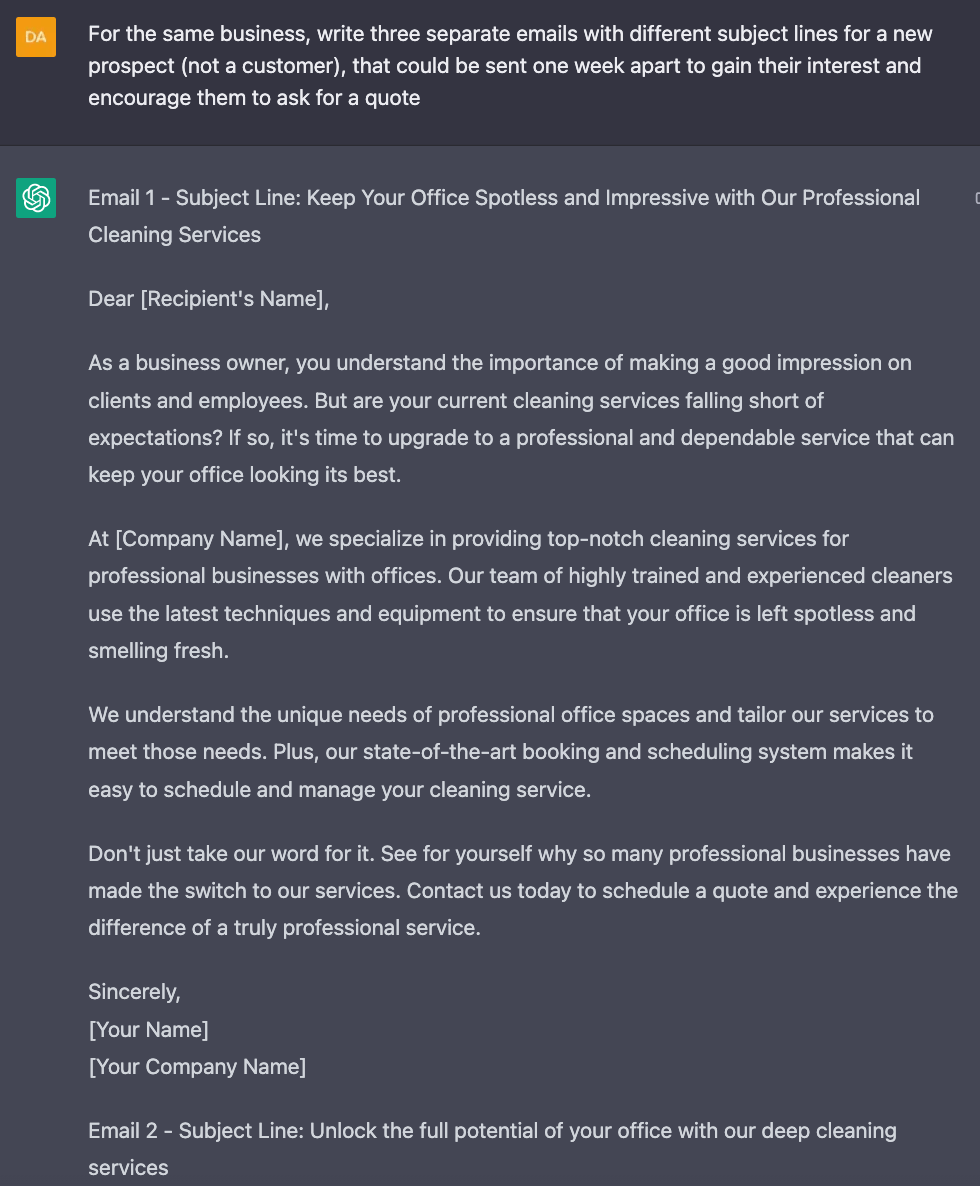
6. Specify your email copy limits
The subject lines above are perhaps a little overlong, but could be OK for an initial test. You can also usefully specify the number of characters. It's cool that for Google Ads for example, that ChatGPT knows the limits (although it was only trained up to 2001, so bear in mind they could be out-of-date).
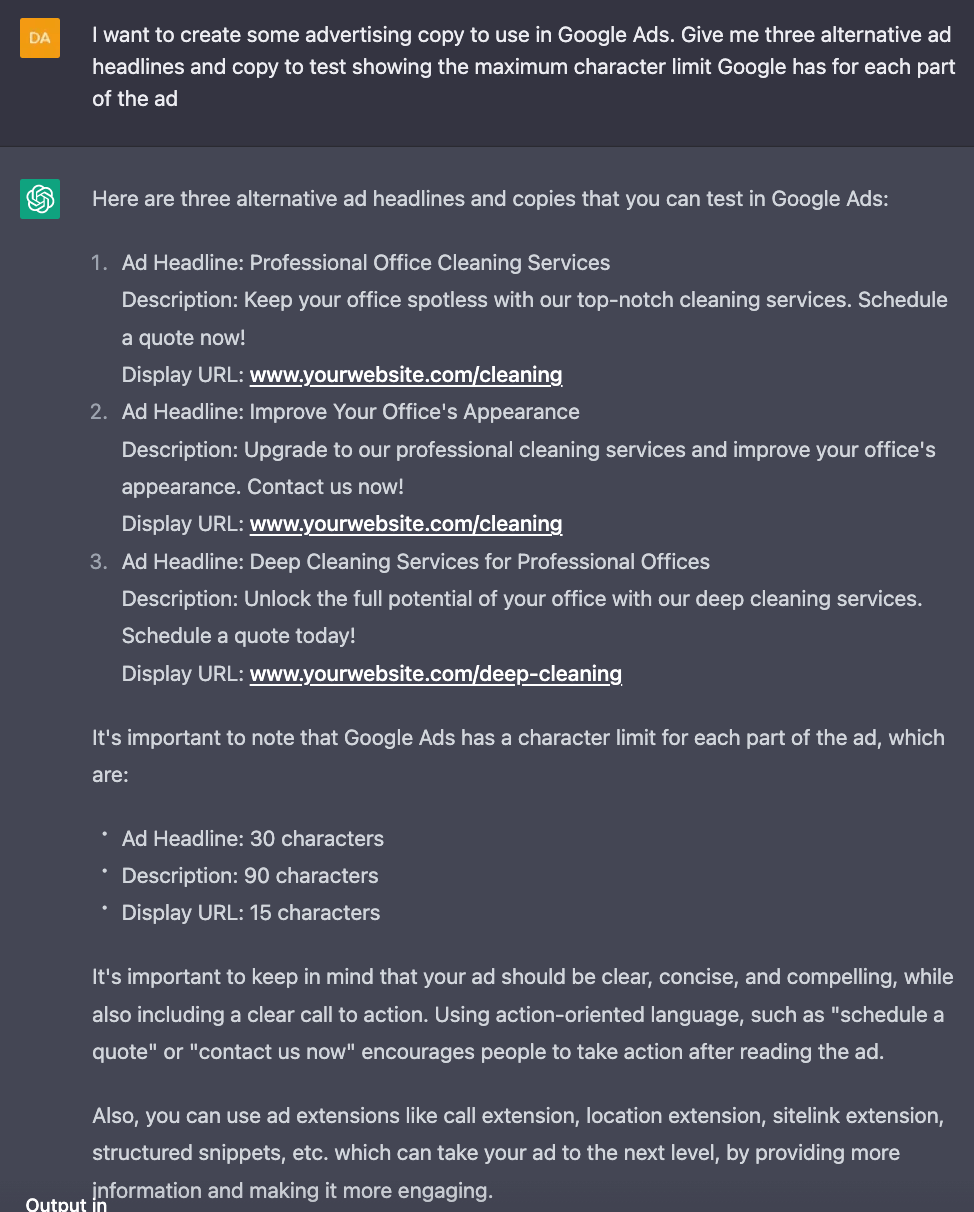
7. Learn from your AI
As you use ChatGPT, use it as an opportunity to learn practices by asking it why it has done things in a particular way and what they are based on. Don't just treat ChatGPT as a black box, ask it why it has chosen particular approaches. Here I ask it why it has structured the email as it has. This is the type of explanation you would get in a book or course on email marketing from an expert, great since it can help inform your own copywriting approach.
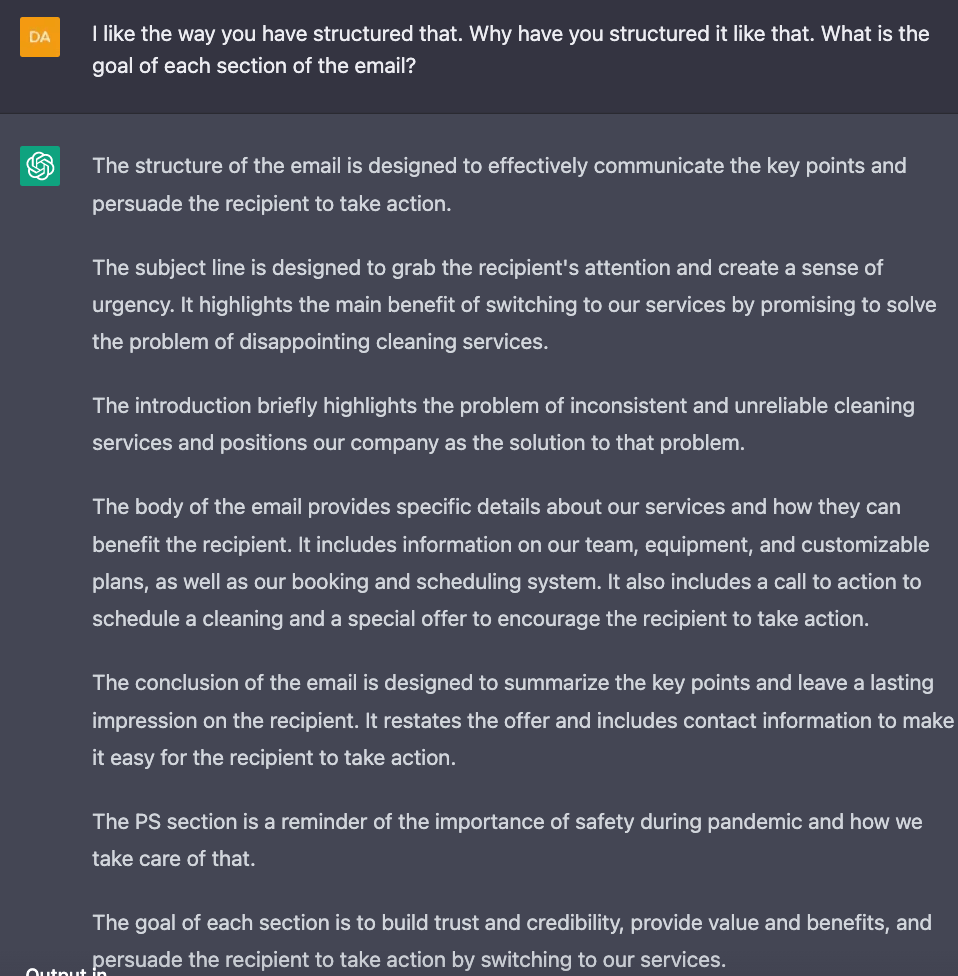
8. Find the source of the recommendations
You can take this one step further by asking to learn from experts in this field. Here we see some good recommendations. Not sure about Neil Patel as an Email marketing expert though...
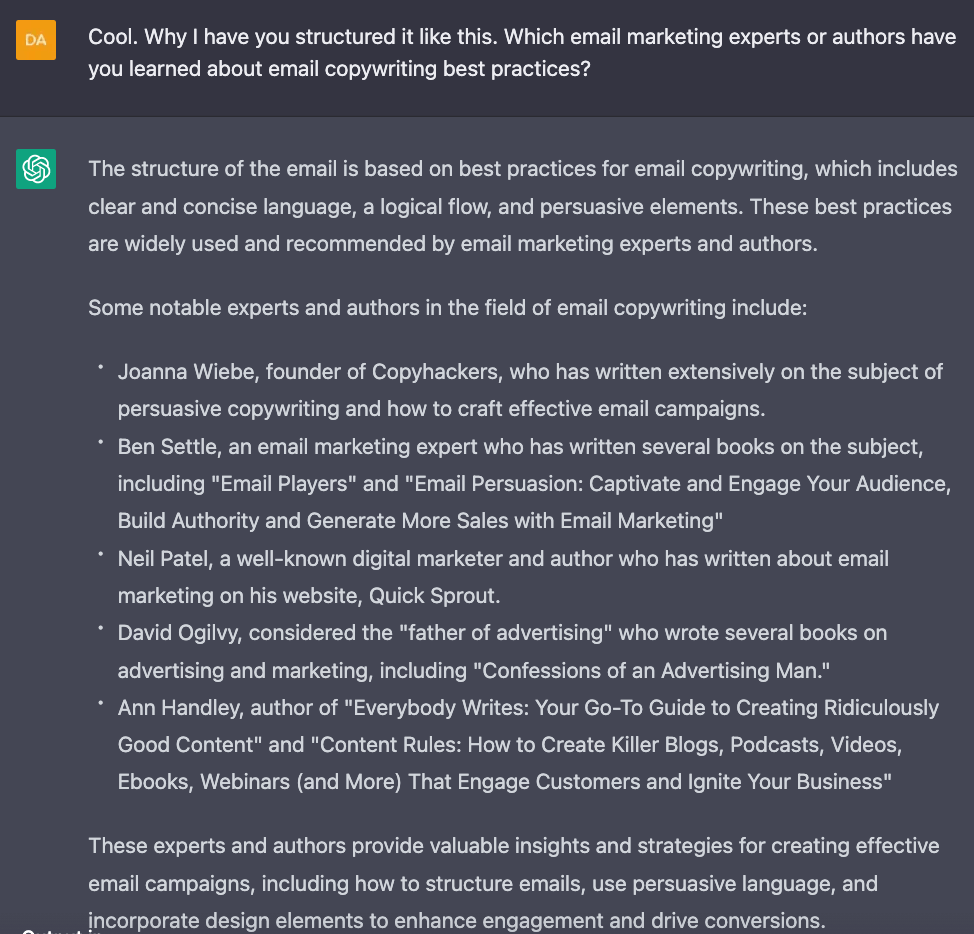
On LinkedIn, Email copy specialist Chase Diamond shared some more ChatGPT prompts for email copywriting.
We'll now look at some of the best recommendations of prompts for other digital marketing channels. Some of the best compilations are from those curated and shared by Alex Velinov, the CTO of Tag Digital based in Glasgow in his two popular prompt lists on LinkedIn (ChatGPT for Marketing List 1 and List 2) , linking to different specialists in their field. I'll highlight which I think are some of the most useful of these grouped by digital marketing channel.
Organic search ChatGPT prompt examples
9. Generate relevant topics for growing organic search presence
It's not surprising that GenAI is well-positioned to generate keyword topics for writers.
Renowned SEO consultant Aleyda Solis has the best organic search summary here, with her blog ChatGPT for SEO: 20 Ways to Leverage ChatGPT in your SEO Activities.
These include prompts to create alternative titles and meta descriptions for posts. I also recommend these two Chrome extensions which will you find the best prompts:
She reminds us that using ChatGPT to support content generation for organic search will be OK if people check the quality and improve - as I have said - a collaborative approach.
10. Classify new/existing keywords based on defined success factors
Aleyda's recommendations also include keyword analysis and keyword clustering tools. Here are some examples:
- “Classify the following keyword list in groups based on their search intent, whether commercial, transactional or informational: …”
- “Cluster the following keywords into groups based on their semantic relevance: ….”
- “Translate the following keywords from <Source Language> to <Output Language> and generate the results in a table with two columns, with the keywords in <Source Language> in the first one, and their translation to <Output Language> in the second:”
I'm not a fan of these since they don't give the relative volumes of search or impressions for different search terms which Google's Keyword Planner or Search Console do. So I won't be using these.
If you're using GSC, then this is a cool technique for grouping or clustering keywords neatly:
Paid search prompt examples
11. Refine paid search positioning and targeting with AI research prompts
Social media marketing prompt examples
12. Generate social media campaigns and assets
Jon Loomer has specialized in Facebook ad strategy for a long time, so interesting to see his take
If you're more focused on LinkedIn, take a look at these:
Other marketing and digital marketing applications
13. ChatGPT for market research generation
This handy Using ChatGPT to automate Market research video by Andy Gray starts by asking ChatGPT to "Write a list of the top 10 Danish fashion brands and include their website url, instagram url, facebook url and tiktok url". This is then formatted into a table and exported into Google Sheets for reference.
14. ChatGPT for eCommerce product descriptions
This video on how to Automate writing eCommerce product descriptions with OpenAI by Elliott Davidson shows how to integrate ChatGPT responses with Google Sheets which is powerful for marketers managing a large number of product descriptions.
15. Advise on ChatGPT prompts for marketing
Interestingly enough, our free A-Z ChatGPT Prompt cheatsheet for marketers was created in collaboration with ChatGPT! We started by prompting ChatGPT to create a glossary:
Prompt: “Write a glossary of terms for features and techniques for using ChatGPT titled: The A-Z of Prompting with ChatGPT for copywriters”.
This was a great starting point, but didn’t include some of the less obvious, more advanced features of ChatGPT we wanted to pass onto you, such as custom instructions, templates, temperature and TLDR.
So we took the original list, used Regenerate to get 26 more ideas and have added to it to with our own ideas to include some of the more advanced practical techniques too, including:
- Adaptive learning: Prompt ChatGPT to improve copy for SEO using E-E-A-T, or to recommend emojis to increase interaction with social posts
- Custom Instructions: Save personalized prompt templates to inform ChatGPT about your business requirements
- Grammar check, Headline suggester, Information sources... and more!
Download this marketing prompt cheatsheet for free and keep it bookmarked for a quick reference.
Download our Free Resource – ChatGPT Prompt Cheatsheet for Marketers
More detailed prompt examples plus an A-Z of all the top prompting tips you need to maximize ChatGPT's output for marketing.
Access the ChatGPT Prompt Cheatsheet for Marketers
So, that's my compilation of ChatGPT prompts that can be used by marketers. I hope there are some can apply to your marketing? If you get to here via LinkedIn, please share the post or share any prompting techniques or tools that you found useful and I can check them out and add to this post!




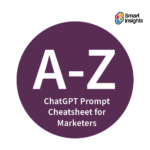
 I'm not impressed by these Subject lines TBH, they are 'marketing happy talk', which I'll explain how to improve upon below.
I'm not impressed by these Subject lines TBH, they are 'marketing happy talk', which I'll explain how to improve upon below.








